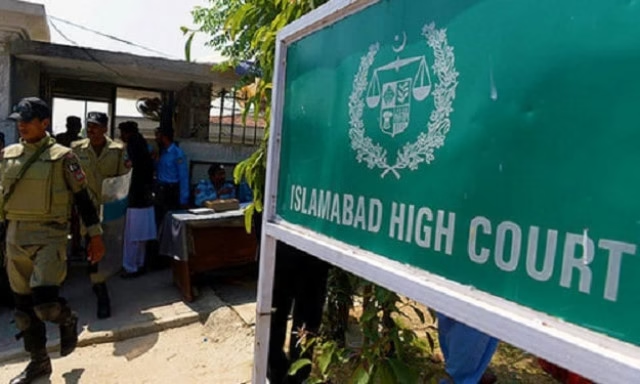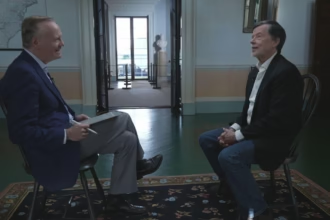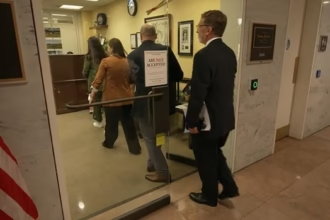ISLAMABAD:
Ahead of a full-court meeting of the Islamabad High Court, scheduled for today, two IHC judges have raised serious questions about the lack of transparency in the high court.
Justice Babar Sattar and Justice Sardar Ejaz Ishaq Khan have written separate letters to IHC Chief Justice Sardar Sarfraz Dogar. Copies of the letters have also been sent to all IHC judges.
Both judges urged the IHC CJ to include the points raised in the letters in the full-court meeting.
Justice Babar Sattar highlighted the lack of transparency and rationale in the listing of cases and the preparation of rosters under the watch of Justice Dogar, who was transferred to the IHC from the Lahore High Court amid a protest by five IHC judges, including Justice Sattar and Justice Khan.
“As opposed to respected institutional norms, you have created rosters that exclude senior judges, including the IHC Senior Puisne Judge (Mohsin Akhtar Kayani), from heading divisional benches.”
He asked whether the listing of cases should rest on the whims of the CJ or whether there should be transparency in deciding who hears which case, while matching the expertise of judges to the work assigned to them.
“We write in our judgments every day that public officials aren’t kings and that their administrative powers are neither unfettered nor should they be exercised in a colorable manner.
“The cause lists issued under your watch show that cases are mostly assigned to transferred and additional judges, leaving out permanent judges of the IHC who opposed your transfer to the IHC.
“While exercising the administrative powers of the IHC, should one not remember that judges, including the CJ, are public officials too — and not kings?” he asked. Justice Babar Sattar also highlighted the IHC’s alleged failure to exercise supervision and control over the subordinate judiciary.
“Is the IHC discharging its obligation to supervise and control courts subordinate to it, or does it continue to look like a game of musical chairs played predominantly by deputationists, as required by Article 203 of the Constitution?
“Can judges of the Islamabad District Judiciary manning such courts discharge their judicial functions without fear? Does the IHC not have the responsibility to develop the district judiciary as an independent institution possessed of integrity and efficiency?”
Justice Sattar also told the IHC CJ that under his watch, they have seen the office refusing to issue cause lists in breach of judicial orders and cases being transferred from the docket of one court to another.
“Most recently, we have seen the issuance of rosters to deprive two judges (including me) of their dockets in a move to render them dysfunctional with regard to their single-bench work. These may be successful maneuvers in rendering some judges irrelevant.
“Our judicial history is replete with similar malpractices that spread during authoritarian times. But is such subversion of judicial independence justifiable?” he asked.
The letter also objected to the composition of committees which are “undermining” the high court’s collegiate character. Justice Sattar told the IHC CJ that he had excluded two senior IHC judges from administrative committees.
He also said that the IHC CJ had assumed powers to issue a circular requiring judges to seek an NOC from him to travel out of the country, essentially placing judges on the Exit Control List.
“Neither the Constitution nor the law vests such rule-making power in the office of the CJ to exercise authority over his peers. The draft rules circulated for consideration during the full-court meeting also seek to concentrate all administrative powers in the office of the CJ.”
The IHC judge said that judges are among the highest-paid public officials and should be strictly held to account for their performance by the public.
“But shouldn’t there be an agreed objective framework for performance evaluation? Under your watch, the IHC has issued skewed statistics. These statistics are designed to cultivate an impression that some judges work super efficiently, while others do not work at all.
“What if a curious researcher were to investigate the nature (and number) of cases assigned to the ‘performing’ judges versus others, and the nature, quality, and length of orders that make up their disposal figures?
“Should we not put together a consensual performance-evaluation criterion as well as guidance for which judgments are to be reported, to earnestly seek to enhance our performance and hold ourselves to account, instead of engaging in deceptive advertising?” the letter said.
Referring to the letters, former additional attorney general Tariq Mahmood Khokhar said the prerogative of a chief justice to act as master of the roster is not an absolute dominion but a constitutional trust.
“The power of the roster cannot be weaponized to marginalise judges in order to shield the executive. It appears that a tool of administration has been turned into an instrument of bench-packing.”
Khokhar stated that in liberal rule-of-law countries such as the UK, USA, Canada and Australia, case allocation is regulated by transparent rules, randomisation, and collegial safeguards. “No Chief Justice there may arbitrarily sideline colleagues.”
He said that in India, the power is exercised fairly and cannot be weaponized to marginalise judges or manipulate outcomes. The inaction of the Supreme Court of Pakistan in the face of such shenanigans is a “legal astonishment” signalling acquiescence in executive capture of the judiciary.
“Judicial independence belongs not to some judges but to the entire judiciary; to curtail it by administrative subterfuge is a constitutional impropriety of the gravest order. I cannot imagine any independent judiciary with such ludicrous segregation,” he said.
He added that Pakistan no longer has structural safeguards: transparent rostering, random allocation, collegial decision-making for sensitive cases, and effective judicial oversight.
“We are seeing judicial independence versus administrative discretion. A Chief Justice as master of the roster transcends independent puisne judges, rule of law, separation of powers, transparency and impartiality. This is judicial tyranny under the garb of an inverted ‘administrative prerogative’.
“In an era of inverted ‘jurisprudence,’ our descent into a judicial abyss continues.”
Advocate Abdul Moiz Jaferii stated that this is another manifestation of rule by roster, which has been prevalent for a number of years to crush and control independent judges.
“It became more public when former chief justice of Pakistan Umar Ata Bandial started running the entire Supreme Court through a roster of three judges.” He said it was basically sacrificing judicial efficiency at the altar of control.
“The manifestation we see here is all the more unfortunate because two stellar judges have been reduced in their role and scope. We are now awaiting the next axe, which we are told might be another fiddle with the Constitution – and that might just serve as the last straw,” Jaferii added.









